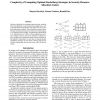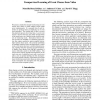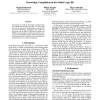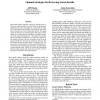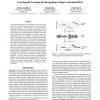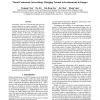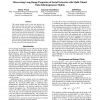113
click to vote
AAAI
2010
15 years 2 months ago
2010
Recently, algorithms for computing game-theoretic solutions have been deployed in real-world security applications, such as the placement of checkpoints and canine units at Los An...
AAAI
2010
15 years 2 months ago
2010
We consider problems where several individuals each need to make a yes/no choice regarding a number of issues and these choices then need to be aggregated into a collective choice...
100
click to vote
AAAI
2010
15 years 2 months ago
2010
The concept of distance rationalizability allows one to define new voting rules or "rationalize" existing ones via a consensus class of elections and a distance. A conse...
151
click to vote
AAAI
2010
15 years 2 months ago
2010
We present a method for unsupervised learning of event classes from videos in which multiple actions might occur simultaneously. It is assumed that all such activities are produce...
AAAI
2010
15 years 2 months ago
2010
In this paper, we study the knowledge compilation task for propositional epistemic logic S5. We first extend many of the queries and transformations considered in the classical kn...
AAAI
2010
15 years 2 months ago
2010
Web search engines respond to a query by returning more results than can be reasonably reviewed. These results typically include the title, link, and snippet of content from the t...
AAAI
2010
15 years 2 months ago
2010
We consider the problem of automatic vocal melody transcription: translating an audio recording of a sung melody into a musical score. While previous work has focused on finding t...
145
click to vote
AAAI
2010
15 years 2 months ago
2010
Advertising in the case of textual Web pages has been studied extensively by many researchers. However, with the increasing amount of multimedia data such as image, audio and vide...
AAAI
2010
15 years 2 months ago
2010
The current methods used to mine and analyze temporal social network data make two assumptions: all edges have the same strength, and all parameters are time-homogeneous. We show ...
104
Voted
AAAI
2010
15 years 2 months ago
2010
We present an interactive learning method that enables a user to iteratively refine a regression model. The user examines the output of the model, visualized as the vertical axis ...
